3e少儿英语口语一级
“3E”原则,让小学英语口语教学更高效
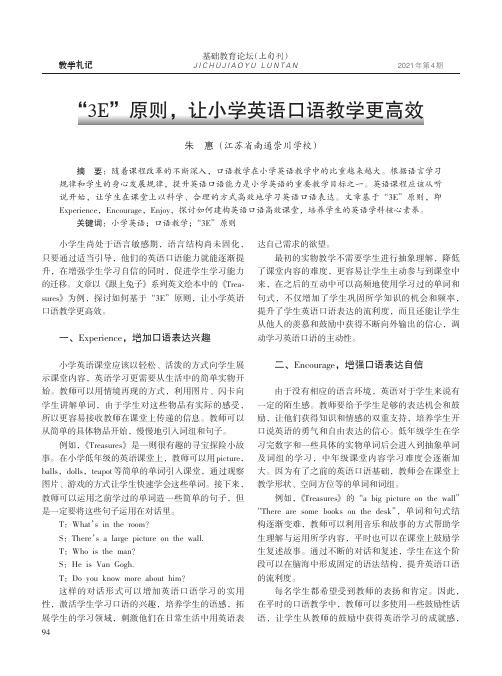
J I C H U J I A O Y U L U N T A N基础教育论坛(上旬刊)2021年第4期“3E ”原则,让小学英语口语教学更高效摘要:随着课程改革的不断深入,口语教学在小学英语教学中的比重越来越大。
根据语言学习规律和学生的身心发展规律,提升英语口语能力是小学英语的重要教学目标之一。
英语课程应该从听说开始,让学生在课堂上以科学、合理的方式高效地学习英语口语表达。
文章基于“3E ”原则,即Experience ,Encourage ,Enjoy ,探讨如何建构英语口语高效课堂,培养学生的英语学科核心素养。
关键词:小学英语;口语教学;“3E ”原则小学生尚处于语言敏感期,语言结构尚未固化,只要通过适当引导,他们的英语口语能力就能逐渐提升,在增强学生学习自信的同时,促进学生学习能力的迁移。
文章以《跟上兔子》系列英文绘本中的《Trea⁃sures 》为例,探讨如何基于“3E ”原则,让小学英语口语教学更高效。
一、Experience ,增加口语表达兴趣小学英语课堂应该以轻松、活泼的方式向学生展示课堂内容,英语学习更需要从生活中的简单实物开始。
教师可以用情境再现的方式,利用图片、闪卡向学生讲解单词,由于学生对这些物品有实际的感受,所以更容易接收教师在课堂上传递的信息。
教师可以从简单的具体物品开始,慢慢地引入词组和句子。
例如,《Treasures 》是一则很有趣的寻宝探险小故事。
在小学低年级的英语课堂上,教师可以用picture ,balls ,dolls ,teapot 等简单的单词引入课堂,通过观察图片、游戏的方式让学生快速学会这些单词。
接下来,教师可以运用之前学过的单词造一些简单的句子,但是一定要将这些句子运用在对话里。
T :What ’s in the room ?S :There ’s a large picture on the wall.T :Who is the man ?S :He is Van Gogh.T :Do you know more about him ?这样的对话形式可以增加英语口语学习的实用性,激活学生学习口语的兴趣,培养学生的语感,拓展学生的学习领域,刺激他们在日常生活中用英语表达自己需求的欲望。
剑桥少儿英语一级考级口语练习备课讲稿

剑桥少儿英语一级考级口语练习剑桥英语一级口语句型1.What's your name?2.What's your mother's name?3.What's your friend's name?How old is your friend?Where do you see your friend?What do you do with your friend?4. What’s your teacher’s name?Is your teacher a man or a woman?5.How old are you?How old is your father?How old is your grandmother?6.What color do you like? What's your favorite color?What color is your chair?7.What animal do you like?Have you got an animal at home?8.What fruit do you like?9.What's your favorite food? \ What food do you like?What do you eat for breakfast\lunch\supper?When do you eat rice\bread?Do you eat rice for lunch?What do you drink at breakfast?10.What's your favorite fruit? \ What fruit do you like?11.What's your favorite drink? \What drink do you like?12.What's your favorite sport? \ What sport do you like?What sports do you play? Where do you play?Who do you play with? Do you play basketball?What sport do you watch on TV?What sport do you play at school?13.What's your favorite lesson? \ What lesson do you like?14.What's your favorite game? \ What game do you like?What games do you play?Where do you play? Who do you play with?19.Do you like apples?20.Do you like blue?21.Do you like swimming?22. Can you swim?Can you ride a horse\an elephant?23. Have you got a book?24. Who is your teacher?25. Who is your best friend?26. How do you go to school?27. How many rulers are there?How many people are there in your family?How many brothers and sisters have you got?How many phones have you got in your house?Do you live in a big house or small house?How many rooms are there in your house?How many teachers have you got?How many beds are there in your house?How many pictures have you got in your bedroom?29. Where’s your bed?Where do you watch TV?Do you like TV?Who watches TV with you?Where do you live?32. Put the...( in, on, under, behind, between, in front of, next to, near) the...33. What's this?34. What's that?35. What is the man doing?36. What's on the desk?37. What's in my hand?40. What are you wearing?What are you wearing on your feet?Are you wearing shoes?What color are your shoes?44. What can you see?45.Is this a jacket?46.What have you got?Have you got a camera?Have you got a pen\clock?Have you got a yellow hat?Have you got a big bed or a small bed?Have you got a school bag?What color is your bag?47.Can you draw?What do you draw at school?What toys do you play with?48. What color are your eyes?Do you wear glasses?48.Do you like books?Where do you read books?49.Do you have a mirror in your bathroom?Is your mirror big or small?50.Where do you learn English?Is your school big or small?Who do you sit next to at school? 51.Have you got long or short hair?What color is your hair?52.Have you got a computer?Where’s your computer?。
小学英语“ 3E ”口语教学的策略

小学英语“ 3E ”口语教学的策略作者:周妍呈来源:《校园英语·月末》2022年第01期摘要:“哑巴英语”现象在我国学生的英语学习中普遍存在,是教师急需解决的一个重要问题。
本文立足小学英语“3E”口语教学的实践情况,从课堂教学和课外活动两方面概述了提高学生口语交际能力的有效策略。
关键词:英语口语教学;Experience;Encourage;Enjoy作者簡介:周妍呈,南通市崇川小学。
英语是一门兼具工具性与人文性的课程。
但在我国的英语学习中,“哑巴英语”现象普遍存在。
学生有一定的词汇基础和语法知识,却在口头表达、交际运用时犯了难。
这种忽略口头表达、交际应用的英语教学方式不仅不利于培养学生用英语与他人交流的能力,也不利于提升学生的综合人文素养。
为了解决这一问题,并实现英语课程的双重目标,教师围绕“3E”口语教学展开实践。
在小学英语“ 3E ”口语教学中,教师致力于创设语言活动,让学生亲身体验,敢于用英语表达,善于用英语交际,从中获得成就感与愉悦感。
为了帮助学生在其原有的知识结构上拓展口语语言知识和语用知识,使学生在不同程度上得到提升,笔者做了如下研究:一、把Experience带进课堂英语是一门交际性很强的学科。
在学习英语的过程中,教师应多给予学生参与体验的机会,进一步促进学生思维能力的发展。
教师可从以下三点改进课堂教学:1.摒弃盲目学习,注重文本创新;2.摒弃重复操练,注重真实语境;3.摒弃机械模仿,注重个性输出。
口语教学中,教师应让体验参与成为常态,让英语学习走向高效。
T: Mike goes to see the dentist. Try to make up a new dialogue according to the text and act it out. Use your actions and tones to act better.T: Mike has a toothache because he eats a lot of sweets. What do you learn from it?S1: We shouldn't eat too much sweet food.S2: We should brush our teeth every day....T: We should have a healthy lifestyle. Do you know other ways to be healthy?S1: We should wash our hands before meals.S2: We should do some sports.S3: We shouldn't eat too much junk food....T: Let's enjoy the poem "To be Healthy".S: Brush our teeth and wash our hands.Listen to music and do some sports.Eat well and sleep sound.Then comes healthy life and happy time.T: Can you do that?S: Yes!在译林版小学英语五年级下册Unit 4 “Seeing the doctor”的Story time板块教学中,教师采用了口语训练中常用的训练形式——角色扮演。
三一口语一级宝典

GESE 1重点词汇(Unit 1------Unit 5)Unit 11 hello 你好2 name 名字3 good 好的4 morning 早上5 afternoon 下午6 evening 晚上7 nice 美好的8 sun 太阳9 girl 女孩10 bed 床11 clock 钟表12 boy 男孩13 light 灯14 chair 椅子15 door 门16 table 桌子17 window 窗户18 school 学校19 dog 狗20 here 这里21 come 来22 go 去23 meet 见面Unit 21数字1-----20 的英文说法one two three four five six seven eight nine ten 1 2 3 4 5 6 7 8 9 10 eleven twelve thirteen fourteen fifteen sixteen seventeen eighteen 11 12 13 14 15 16 17 18 nineteen twenty19 202 tree 树3 football 足球4 bird 鸟5 peach 桃子6 monkey 猴子7 skateboard 滑冰鞋8 birthday cake 生日蛋糕9 candle 蜡烛10 stand 站11 sit 坐Unit 31 desk 书桌2 ruler 尺子3 picture 图画4 eraser 橡皮5 door 门6 blackboard 黑板7 pen 钢笔8 book 书9 close 关上10 open 打开11 this 这12 that 那13 these 这些14 those 那些Unit 41 who 谁2 mum 妈妈3 classroom 教室4 run 跑5 jump 跳6 pencil 铅笔7 my 我的8 your 你的9 his 他的10 her 她的11 its 它的12 our 我们的13 their 他们的、她们的、它们的Unit 51 sweet 糖果2 flower 花3 many 很多4 how many 有多少GESE1级重点句型(Unit 1—Unit 5)Unit 11 Good morning! 回答:Good morning! 早上好!2 Good afternoon! 回答:Good afternoon! 下午好!3 Good evening! 回答:Good evening! 晚上好!4 Hello, what’s your name? 你好,你叫什么名字?My name is…………5 Nice to meet you! 很高兴见到你!回答:Nice to meet you, too! 见到你也很高兴!Unit 21How old are you? 你几岁了?回答:I am…数字2 How old is she/ he ? 她/ 他几岁了?回答:She/ He is…数字3 How many…名词复数… are there ? 有多少……..?回答:There are …数字There is one. 只有一个。
三一口语三级第1-8讲 讲义(完整版)

GESE - Grade 3 Unit 1This is My School.I. Words & Phrases方位: next to(紧挨着), beside(在…旁边), behind(在…后面), in front of(在…前面),under(在…下面), on(在…上面), in(在…里面)学校: classroom building(教学楼), gym(体育馆), playground(操场), basketball court(篮球场), library(图书馆), dining hall(食堂), gate(大门), auditorium(礼堂), dormitory building(宿舍楼), sports field(运动场), swimming pool(游泳池), slide(滑梯), swing(秋千), floor(楼层,地面), the first floor(一楼), the second floor(二楼), the third floor(三楼), teacher’s office(教师办公室), clinic(医务室), washroom(洗手间), computer room(机房), music room(音乐教室), library(图书馆), piano(钢琴), violin(小提琴)描述性: big / large(大), small / little(小), new(新的), old(旧的), beautiful(美丽的), 运动: sport(运动), sports instruments(运动器材), do sports(做运动), table tennis(乒乓球), badminton(羽毛球),其他: introduce(介绍), describe(描述), laptop(笔记本电脑), finger(手指), fist(拳头), calendar(日历),II. Key sentences (“”表示可替换)1. There’s a / an … in my school. / There’re … in my school.2. My school is very … and … (big / small, large, old / new, beautiful)3. We usually do sports in the playground.III. Q&A (“”表示可替换)1. – Is there a ... in your school? – Are there … in your school?– Yes, there is. / No, there isn’t. – Yes, there are. / No, there aren’t.2. – Where is the gym?– The gym / It is next to the playground.3. – What do you do in the gym?– I usually do sports in the gym.4. – Can you introduce the gym in your school?–The gym is very big and beautiful. There’re many sports instruments there. I usually play badminton there.5. – Can you introduce / describe your school?(or “Tell me something about your school.”)–My school is very big and beautiful. There’re a classroom building, a library, a dining hall, a gym, a playground and some basketball courts in my school. I always study and play there. I love my school very much.6. – Which floor is the washroom on? / Where is the washroom?– The washroom is on the first floor.7. – Is the library on the second floor?– Yes, it is. / No, it isn’t.8. – What’s in the library?– There are many books and bookshelves in the library.9. – What do you do in the library?– I read books in the library.10. – How many classroom buildings are there in your school?– There’re three classroom buildings in my school.GESE - Grade 3 Unit 2What Does Your Father Do?I. Words & Phrases职业: teacher, student, doctor, nurse(护士), worker(工人), singer(歌手), dancer(舞蹈演员), artist(艺术家/画家), writer(作家), editor(编辑), engineer(工程师), computer programmer(计算机编程员), hairdresser(理发师), shop assistant(店员), seller (售货员), clerk(职员), accountant(会计), manager(经理), general manager(总经理), president of the board(董事长), soldier(士兵), policeman(警察), lawyer(律师), farmer(农民), cook(厨师), waiter(男服务生), waitress(女服务生), scientist(科学家), driver(司机), pilot(飞行员), tour guide(导游), judge(法官), reporter(记者), housewife(家庭主妇), stewardess(空姐/女乘务员), secretary(秘书)家庭: family member(家庭成员), father, mother, sister(亲姐妹), brother(亲兄/弟), cousin(堂/表兄弟姐妹), grandpa, grandma, uncle(叔/舅/伯/姨父/姑父), aunt(姑/姨/婶/舅妈)场所: office(办公室), hospital(医院), school(学校), factory(工厂), company(公司), shop/store(商店), shopping mall(卖场), super market(超市), barber(理发店), TV station(电视台), newspaper office(报社)II. Q&A (“”表示可替换)1. – How many people are there in your family?– There’re … people in my family.2. – Who are they?– They’re my father, my mother, my… and me.3. – What does your father do? / What’s your father?– My father is an engineer.4. – Where does he work?– He works in an office.5. – Is he a doctor?– Yes, he is. / No, he’s a cook.6. – Does he work in a hospital?– Yes, he is. / No, he isn’t. He works in a restaurant.7. – What do your parents do?– My father is a … My mother is a …8. – Where do they work?– My father works in … My mother works in …9. – Are they very busy?– Yes, they are. / No, they aren’t.10. – How do they go to work?– My father goes to work by car. / My father drives to work.My mother goes to work by subway / by bus / by foot.GESE - Grade 3 Unit 3What’s the date today?I. Words & Phrases月份: January(Jan.), February(Feb.), March(Mar.), April(Apr.), May, June(Jun.), July(Jul.), August(Aug.), September(Sep.), October(Oct.), November(Nov.), December(Dec.)日期: date(日期), Jan. 25(Jan. the twenty-fifth / January the twenty-fifth / the twenty-fifth of January)时间: hour(小时), half an hour(半小时), quarter(15分钟;四分之一), minute(分钟), second(秒), am(上午), pm(下午)II. Q&A (“” 表示可替换)1. – How many seconds are there in a / one minute?–There’re 60 seconds in a minute.2. – How many minutes are there in an hour?– There’re 60 minutes in an hour.3. – How many hours are there in a day?– There’re 24 hours in a day.4. – How many days are there in January?– There’re 31 days in January.5. – How many months are there in a season?– There’re 4 months in a season.6. – How many seasons are there in a year?– There’re 4 seasons in a year.7. – How many months are there in a year?– There’re 12 months in a year.8. – What’s the date today? / What date is it today? (Feb. 14)– It’s February the fourteenth. / It’s the fourteenth of February.9. – What day is today? / What day is it today?– It’s Wednesday.10. – What time is it (now)?– It’s nine o’clock. (9:00)It’s nine twenty-four. (9:24)It’s nine fifteen. / It’s a quarter past nine. (9:15)It’s nine forty-five. / It’s a quarter to ten. (9:45)It’s nine thirty. / It’s half past nine. (9:30)It’s 8:15 am. / It’s 10:45 pm.GESE - Grade 3 Unit 4When do you go to school?I. Words & Phrases短语: wake up(醒来), get up, one’s(某人的), brush one’s teeth(刷牙), wash one’s face(洗脸), have breakfast(吃早饭), go to school(上学), have classes(上课), have lunch(吃午饭), do sports(做运动), go home, have dinner/supper(吃晚饭), do homework(做作业), watch TV(看电视), go to bed(睡觉)学科: subject(学科), Chinese(语文), math(数学), English(英语), dancing lesson(舞蹈课)其他: am(上午), pm(下午), at the weekend(周末) , at school(在学校), after school(放学后), at home(在家), once(一次), twice(两次), three times(三次) II. Q&A (“” 表示可替换;根据实际情况回答)1. – When do you get up in the morning? (when = what time)–I usually get up at six o’clock. Sometimes I get up at seven o’clock, because I have no lesson at the weekend.2. – When do you have breakfast?– I usually have breakfast at seven o’clock. Sometimes I have breakfast at half past seven, because I get up late.3. – What time do you go to school?– I go to school at 7:30.4. – What subjects do you have?– I have math, English, Chinese, PE, music, art and science. I like English best, because I like to speak English.5. – What do you usually do after school / in the evening?– I usually have dinner at six o’clock. Then I do my homework. SometimesI watch TV after diner.6. – Do you have any lessons at the weekend?– Yes, I have English lessons on Saturday and on Sunday I have a math lesson.–No, I don’t have any lessons on Saturday and Sunday, so I can play with my friends. I love my weekend.7. – What do you usually do at the weekend?–I have some lessons on Saturday and on Sunday I usually play basketball with my friends.8. – How often do you play basketball?– I play basketball twice a week.GESE - Grade 3 Unit 6What are they doing?I. Words & Phrases短语: write a letter(写信), do one’s homework, teach English, read books, watch TV, sweep the floor(扫地), clean the bedroom(打扫卧室), water the flowers(浇花), set the table(摆餐桌), listen to music, play soccer(踢足球), ride a bike, ride a horse(骑马), do exercises(锻炼、做操), fly a kite, play chess(下棋), play the violin(拉小提琴), play the piano(弹钢琴), play the drum(打鼓), play baseball(打棒球), play volleyball(打排球), climb the mountain(爬山)特殊的动词ing形式: take(taking), make(making), have(having), ride(riding), write(writing), dance(dancing), hike(hiking), set(setting), jog(jogging), run(running), swim(swimming),其他: hike(远足), fish(钓鱼)II. Q&A (根据实际情况回答)1. – What are you doing?– I’m watering the flowers.2. – What’s he doing?– He’s fishing.3. – What’s she doing?– She’s playing the violin.4. – What are they doing?– They’re playing volleyball.5. – Is he running?– Yes, he is.6. – Is she riding a bike?– No, she’s riding a horse.7. – What is Kate doing?– She’s hiking.8. – Is Mary playing a game?– No, she’s playing a drum.GESE - Grade 3 Unit 7What’s the weather like today?I. Words & Phrases天气:sunny(晴朗的), cloudy(多云的), windy(大风的), rainy(下雨的), raining(正在下雨), snowy(下雪的), snowing(正在下雪), foggy(雾天), stormy(暴风雨/雪天气), lightning(闪电,打闪), hailing(在下冰雹), cold(寒冷的), cool(凉爽的), warm(温暖的), hot(炎热的), wet(潮湿的), dry(干燥的), nice weather(好天气), bad weather(坏天气)其他:have a picnic(野餐), stay home(待在家), in the rain(在雨中), take a walk(散步), in general(总的来说), I’d rather… (我宁愿…)II. Q&A (“” 表示可替换)1. – Nice day, isn’t it? (天气不错,是吧?)Let’s go and have a picnic.– That’s a good idea. (好主意!)2. – What’s the weather like today? / How’s the weather today?– We have bad weather again. It’s cold and windy.3. – Is it snowing?– Yes, it is. / No. It’s raining.4. – What was the weather like yesterday?– It was foggy yesterday.5. – Was it cloudy yesterday?– Yes, it was. / No, it was snowy yesterday.6. – How many seasons are there in a year?– There’re four seasons in a year.7. – What’s the weather like here in spring?– It’s usually cold and dry here in spring.But in general, it’s getting warmer and warmer.8. – Is it cold in Beijing (or “here”) in summer?– No, it’s usually very hot and wet here in summer.9. – What do you like to do in winter?– I like to skate and make a snowman in winter.10. – Do you like to fly a kite in autumn?– Yes I do. / No. I like to … in autumn.11. – When can you make a snowman?– I can make it in winter.12. – When is winter?– Winter is (lasting) from December to February here in Beijing.13. – Do you like to take a walk on rainy days?– Yes, I do. / No. I’d rather stay at home on rainy days.14. – What do you want to do on rainy days?– I want to stay at home with my parents.15. – What do you like to do on sunny days?– I like to go outside and play with my friends.GESE - Grade 3 Unit 8Where were you yesterday morning?I. Words & PhrasesBe动词: was(“be”过去式单数), were(“be”过去式复数.)其他: schedule(日程表); sunny, rainy, snowy(雪天), windy, cloudy, foggy(雾天) 场所: at home(在家), at school(在学校上课), in the garden(在花园), in the playground(在操场), in the hospital(在医院), in the store(在商店), in the bank(在银行), in the park(在公园)II. Q&A (“” 表示可替换)1. – Where were you yesterday?– I was at school (yesterday).2. – Were you at home the day before yesterday?– Yes, I was. / No, I was in the park.3. – Where were the pencils this morning?– The pencils were on the sofa this morning.4. – What was the weather like yesterday?– It was foggy yesterday.5. – Was it cloudy yesterday?– Yes, it was. / No, it was snowy yesterday.6. – What day was it yesterday?– It was Friday (yesterday).7. – Was it Saturday yesterday?– Yes, it was. / No, it was Sunday (yesterday).8. – Wasn’t it Wednesday yesterday?– No. It was Thursday yesterday.9. – What was the date yesterday?– It was Jan. 5 (yesterday).10. – When is your birthday?– My birthday is on February 18.GESE - Grade 3 Unit 9How can I get to the library?I. Words & Phrases问路:turn right(右转), turn left(左转), on the right / on one’s right(在右边), on the left / on one’s left(在左边), walk along / go along / go down(沿...一直走), walk across / go across(穿过...)其他:turning(转弯处), crossing(十字路口), traffic lights(交通灯), zebra crossing(斑马线), street(大街), road(路)地标:library(图书馆), classroom building(教学楼), dining-hall(食堂), gym(体育馆), swimming pool(游泳池), store(商店),department store(百货商场), bookstore(书店), bank(银行), park, cinema(电影院), bus stop(汽车站), hotel / inn(酒店,宾馆), post office(邮局), theatre(剧院), supermarket(超级市场), restaurant(餐馆), subway station(地铁站), railway station(火车站), police station(警察局), university(大学), bakery(面包房)II. Q&A (“” 表示可替换)1. – Excuse me. How can I get to the classroom building?– Walk along this road and turn left at the second turning.2. – Excuse me. Do you know how to get to the theatre?– Of course. Go down this street and take the third crossing on the right.Walk along. The theatre is on your left.3. – Excuse me. Could you tell me the way to the restaurant?– Sure. Go along this road. Get to Street 1 and turn left.Then you can see the restaurant on your right.4. – Excuse me. Do you know the way to the railway station?– Yes. Go straight ahead for about 100 meters.Then you will find it on your left. You won’t miss it.。
剑桥少儿英语学习系统各级别描述

剑桥少儿英语学习系统各级别描述小学阶段对孩子的英语学习是一个非常重要的阶段,无论从孩子学习英语的年龄特点,对语言的敏感特征还是从孩子的小升初来说,小学阶段都是非常重要的。
要求家长在孩子1、2年级的时候就提前给孩子做好英语学习的规划,做到有条不紊。
很多家长到孩子4、5年级要证书了才开始着急已经来不及了。
剑桥少儿英语学习系统分为预备级、一级、二级、三级共四个级别。
预备级:适合4-6岁儿童,是剑桥少儿英语考试的附属级别。
一级:适合6-8岁,经过大约240学时的英语学习,掌握近400个词汇,能够简单描述家庭、学校、朋友、自己、体育运动和业余活动等主题,涉及年龄、外貌、颜色等概念。
二级:适合8-11岁,经过大约420学时的英语学习,掌握约600个词汇,具体描述的概念扩展到天气、健康、环境、动作、职责等。
三级:适合9-12岁,经过大约600学时的英语学习,掌握1000个词汇,能够运用学过的词汇讲述自己生活中的人和事,词汇量可达到教育部规定的初中毕业要求。
剑桥少儿英语一级学习内容及特色分析少儿英语学习方法介绍背课文听起来很可怕,每个人似乎都经历过。
不过不能否认,背课文是学英语最好的方法之一。
特别是对于少年儿童更是如此。
作为最有效的学英语的方法,笔者认为有必要提倡孩子多背些课文以增强学习的效果。
其实,背课文是一项虽然艰苦却其乐无穷的学习方式。
只要把握的好,就能够使学生在快乐和成就感中学习。
下面,就这个方法体一些具体的建议。
先说说背课文的好处。
背课文能够使学生全面学习单词和语法,不仅学会每个单词和句法现象的本身,还能够了解它们在实际使用的时候的用法,搭配和其它的语气特征,更好的做到学用结合;并且由于是整个文章或是句子一起理解和接受,所以对于单个语言单位,象单词、语法要点、搭配等的记忆更加牢固。
其次,背课文能够促使孩子多读,而且是大声朗读,这样对于孩子形成良好的语感至关重要。
背一篇课文能帮助孩子强化练习的语流、语速,迅速提高英语口语水平。
3e少儿英语口语三级翻译
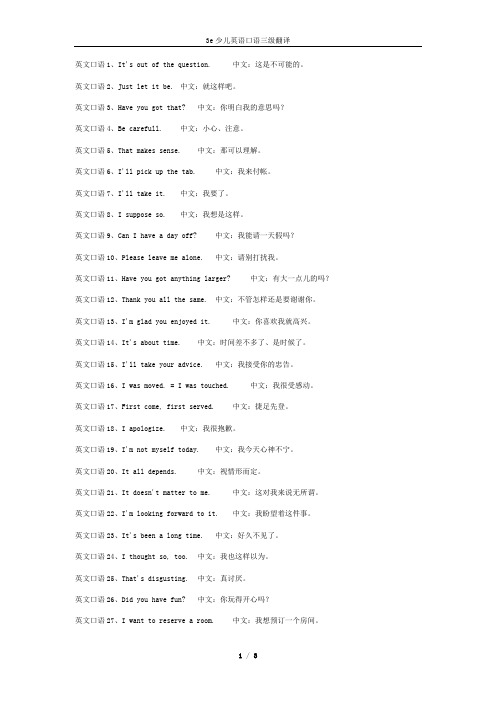
英文口语1、It's out of the question. 中文:这是不可能的。
英文口语2、Just let it be. 中文:就这样吧。
英文口语3、Have you got that? 中文:你明白我的意思吗?英文口语4、Be carefull. 中文:小心、注意。
英文口语5、That makes sense. 中文:那可以理解。
英文口语6、I'll pick up the tab. 中文:我来付帐。
英文口语7、I'll take it. 中文:我要了。
英文口语8、I suppose so. 中文:我想是这样。
英文口语9、Can I have a day off? 中文:我能请一天假吗?英文口语10、Please leave me alone. 中文:请别打扰我。
英文口语11、Have you got anything larger? 中文:有大一点儿的吗?英文口语12、Thank you all the same. 中文:不管怎样还是要谢谢你。
英文口语13、I'm glad you enjoyed it. 中文:你喜欢我就高兴。
英文口语14、It's about time. 中文:时间差不多了、是时候了。
英文口语15、I'll take your advice. 中文:我接受你的忠告。
英文口语16、I was moved. = I was touched. 中文:我很受感动。
英文口语17、First come, first served. 中文:捷足先登。
英文口语18、I apologize. 中文:我很抱歉。
英文口语19、I'm not myself today. 中文:我今天心神不宁。
英文口语20、It all depends. 中文:视情形而定。
英文口语21、It doesn't matter to me. 中文:这对我来说无所谓。
幼儿必备课堂英语口语_英语口语课堂
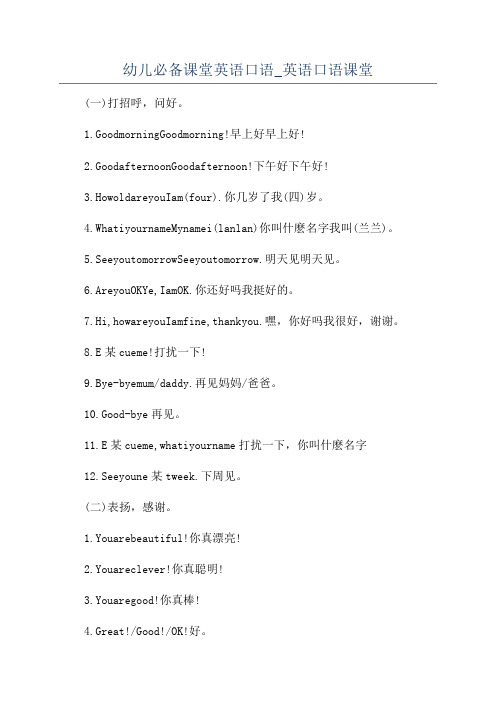
幼儿必备课堂英语口语_英语口语课堂(一)打招呼,问好。
1.GoodmorningGoodmorning!早上好早上好!2.GoodafternoonGoodafternoon!下午好下午好!3.HowoldareyouIam(four).你几岁了我(四)岁。
4.WhatiyournameMynamei(lanlan)你叫什麽名字我叫(兰兰)。
5.SeeyoutomorrowSeeyoutomorrow.明天见明天见。
6.AreyouOKYe,IamOK.你还好吗我挺好的。
7.Hi,howareyouIamfine,thankyou.嘿,你好吗我很好,谢谢。
8.E某cueme!打扰一下!9.Bye-byemum/daddy.再见妈妈/爸爸。
10.Good-bye再见。
11.E某cueme,whatiyourname打扰一下,你叫什麽名字12.Seeyoune某tweek.下周见。
(二)表扬,感谢。
1.Youarebeautiful!你真漂亮!2.Youareclever!你真聪明!3.Youaregood!你真棒!4.Great!/Good!/OK!好。
5.Verynice!非常好!6.HappyNewYear!新年快乐!7.Happybirthday!生日快乐!8.MerryChritma!圣诞快乐!9.Thankyouverymuch!非常感谢你!10.Wonderful!太棒了!11.Iamthewinner!我是胜利者!12.Iamthefirt!我是第一名!13.Youarebeautiful!你真漂亮!15.Howbeautiful!多美呀!16.Howfunny!多有趣呀!17.Wow!It’onice!哇!它太好了。
18.It’aniceday!这是一个很好的一天!19.Oh,mygod/goodne!哦,我的上帝!20.Wow!It’onice/lovely!哇!它太棒了/太可爱了!21.Nicegirl/boy.好女孩/男孩。
少儿英语口语100课(四)

第61课:Happy Children's Day 儿童Today is June the first, Children's Day. 今天是六月一日,儿童节。
What do you do on Children’s Day?儿童节你会做什么呢?We have a class party today.我们今天有班级聚会。
Will you keep me company?你会陪我吗?Are you giving your own performance? 会有你的节目吗?I’m a little excited about that.我有点小激动呢。
Hurry. It is going to start soon.快点,都快开始了。
Use some sun cream.用一些防晒霜。
Stay out of the sun.不要待在太阳下。
I record a video.我录视频。
Look at the camera.看镜头。
I feel like in my second childhood.我感觉好像回到了童年。
I love to see your happy smile.我喜欢看见你们快乐的笑容。
Both of you.你们两个。
Would you take a photo of us?你愿意给我们拍个照吗?what a good lively day!好热闹的一天!第62课:In the Amusement Park 在游乐园里What do you like to play?你想玩什么呢?I have no idea.还没想好呢。
I'll buy a one-day pass.我去买一张通票。
Merry-go-round?旋转木马吗?I want to ride the Ferris wheel.我想坐摩天轮。
Gorgeous!好美啊!Will you go on the flume ride with me?你能和我玩激流勇进吗?I have never ridden the roller coaster.我从来没有坐过云霄飞车。
三一口语1级Unit 2

GESE Grade1 之阳早格格创做Unit2, How old are you?.一.教教目标:助闲教死掌握20以内的数字的英语单词汇,并能道论数量的几战人的年龄.两.沉面教教实质:句型:1.How old are you? I’m XXX..2. How many…are there? There are XXX.3. One Two Three Four Five Six Seven Eight Nine TenEleven Twelve Thirteen Fourteen Fifteen Sixteen Eighteen Nineteen Twenty三.教教要发Part1: 1. Lead the students reading after the teacher slowly and carefully.2. Repeat each sentence more than 3 times.3. Pay attention to the key pronunciation. (a. three b. five c. ten d. thirteen e. twenty)Part2: 1.瞅图数数训练,让教死流利使用20以内的数字.2.央供教死听懂“How many…are there”句型.3.教死听懂How many引出闭于数量的问题,并精确回问.☆句型:How many XXX are there? There are XXX.☆词汇汇:peach 梨 bird 鸟 monkey 猴子 girl女孩 skateboard 滑板Part3: 1.介绍道论年龄句型“How old are you?”2.西席戴发教死瞅图片,引出“死日蛋糕,年龄”话题.3. Look at this picture. This is a party. Look, What’s this?(pointing tothe cake)Is it a cake? Now, Let’s listenPart4: 互动名目:1.教死依据图中所示,相互询问对于圆年龄.2.西席询问教死年龄,以演示例.A: Jane, How old are you? B: I’m elevenPart5: 1.西席发导教死大声道出相映单词汇,共事模仿图中动做.a. Stand upb. Sit downPart6:1.原单元内共归纳,西席戴读,普遍复习原单元所教实质. Homework: 1.沉面教教实质 2. Remember部分背过.。
3e少儿英语口语三级(有英无中)
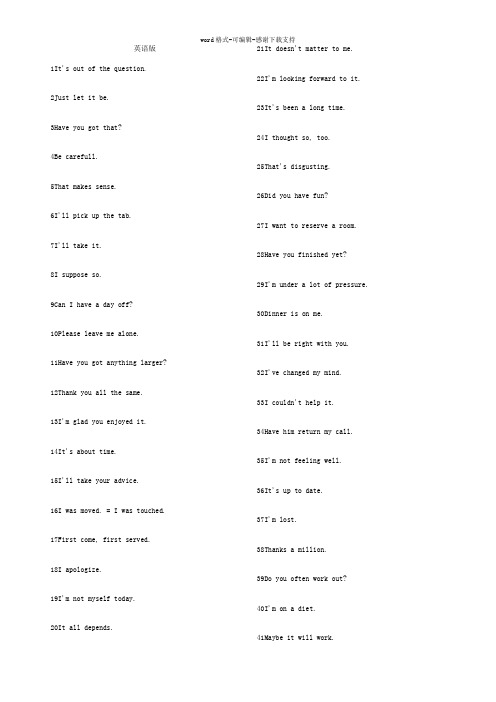
英语版1It's out of the question.2Just let it be.3Have you got that?4Be carefull.5That makes sense.6I'll pick up the tab.7I'll take it.8I suppose so.9Can I have a day off?10Please leave me alone.11Have you got anything larger? 12Thank you all the same.13I'm glad you enjoyed it.14It's about time.15I'll take your advice.16I was moved. = I was touched. 17First come, first served.18I apologize.19I'm not myself today.20It all depends. 21It doesn't matter to me.22I'm looking forward to it. 23It's been a long time.24I thought so, too.25That's disgusting.26Did you have fun?27I want to reserve a room.28Have you finished yet?29I'm under a lot of pressure. 30Dinner is on me.31I'll be right with you.32I've changed my mind.33I couldn't help it.34Have him return my call.35I'm not feeling well.36It's up to date.37I'm lost.38Thanks a million.39Do you often work out?40I'm on a diet.41Maybe it will work.42I'll give you a hand.43Don't mention it.44Let's find out.45Don't be so modest.46I'm sorry I'm late.47I'm on my way.48Could you speak slower?49Let's get to the point.50Can I take a message?51I couldn't get through.52How often do you eat out?53I've had enough.54I'd like to make a reservation. 55Can I take a rain check?56Suit yourself.57Pain past is pleasure.58I'm just having a look.59I was just about to call you. 60It's no big deal.61Please show me the menu.62I appreciate your invitation. 63Can you give me some feedback?64I envy you.65I've got news for you.66The sooner, the better.67You can count on me.68The shortest answer is doing.69Where can I check in?70You should give it a try.71You never know.72You got a good deal.73That's the way it is.74Whatever you think is fine with me. 75That's good to know.76That's not a problem.77We can get by.78That's OK.79What do you think of it?80That's the way I look at it, too.。
儿童常用英语口语

儿童常用英语口语儿童常用英语口语大全引导语:儿童使用的口语通常比较简单,易上口,以下是店铺整理的儿童常用英语口语,欢迎参考!儿童常用英语口语11.Hi/Hello! 您好! Good morning 早上好!2.Hello,nice to meet you !Nice tosee you ! 您好!见到你很高兴。
3.How are you ? I am fine. Thangyou! 您好吗?我很好,谢谢!4.Please say bye—bye to your mammy/daddy.请和妈妈/爸爸说再见。
e in ,piease 请进! Come in /come here, please.请过来。
6.You are beautiful 你真漂亮! You are clever. 你真聪明!7.You are good. 你真棒! Great/ Good/ OK 好!8.Very nice! 非常好! Happy New year! 新年快乐!9.Thank you very much! 非常感谢你! Wonderful ! 太棒了!10.I am the winner 我是胜利者 / I am the first.我是第一名!11.You are beautiful!你真漂亮! You are welcome! 欢迎你!12.How beautiful! 多美呀! How funny! 多有趣呀!13.Wow ! It’s so nice 哇!它太好了 I love you ! 我爱你!14.I like fish /beef / lomb 我喜欢鱼肉/牛肉/羊肉15.I am hungry 我饿了 I am full 我吃饱了16.Have an apple 有一个苹果17.I want to go to the toilet 我想上厕所18.Can I go to toilet.我能上厕所吗? Here you are 给你19.Close your eyes/ mouth 闭上你的眼睛/和上你的'嘴20.Open your eyes/ mouth 睁开你的眼睛/张开你的嘴巴21.Close the door 关门 Open the door 开门22.Return to your seat.回到你的座位上。
yle一级口语讲解

YLE一级口语讲解一、考试简介YLE一级是西班牙语学习的一个重要阶段,也是掌握基础西班牙语的关键时期。
在这个阶段,学生需要掌握基本的西班牙语词汇、语法和听力理解能力,同时能够进行简单的口语交流。
二、考试内容听力理解听力理解部分主要测试学生对听力材料的理解能力。
考试形式为播放录音材料,学生需要听取问题并从选项中选择正确答案。
听力材料通常包括日常生活中的简单对话、短文和电话留言等。
词汇与语法词汇与语法部分主要测试学生对基础词汇和语法的掌握程度。
考试形式为选择题和填空题,学生需要根据题目要求选择正确的单词、短语或完成句子。
口语表达口语表达部分主要测试学生的口语表达能力。
考试形式为根据所给话题进行口头表述,通常要求考生能够介绍自己、描述图片或场景等。
三、备考建议注重基础词汇和语法的学习YLE一级的考试重点在于测试学生的基础词汇和语法知识。
因此,在备考过程中,学生应该注重学习基础词汇和语法,包括动词时态、名词的性数、形容词的变化等。
同时,多做一些词汇和语法练习题,以便更好地掌握这些基础知识。
听力训练听力是口语的基础,因此在备考过程中,学生应该注重听力训练。
可以通过听录音、看西班牙语电影或电视剧等方式来提高自己的听力理解能力。
同时,多做一些听力理解练习题,以便更好地掌握听力技巧和提高自己的听力水平。
口语练习口语表达需要不断的练习和实践。
学生可以通过与老师、同学或语伴进行口语交流来提高自己的口语表达能力。
同时,也可以通过模仿和跟读来训练自己的语音和语调。
在口语练习中,注意纠正自己的发音和语法错误,以便提高自己的口语水平。
四、考试技巧注意时间管理在考试过程中,注意合理分配时间。
在听力理解部分,要尽快阅读题目和选项,以便更好地理解听力材料并做出正确选择。
在词汇与语法部分,要尽可能快速地完成题目,留下足够的时间准备口语表达部分。
保持冷静和自信在考试过程中,保持冷静和自信非常重要。
不要因为一道题目不会做而影响整个考试的情绪。
三一口语1级单词

三一口语一级语法解析语法项目:祈使用词:如go, come, show, point, give, touch, stand up疑问词:What? How many? How old?指示代词:this, that理解及使用:be动词的一般现在时普通名词的单数和有规则的复数形式,如:ear/ears, shoe/shoes简单的形容词,如:small, big, green限定词:a, the, my, your, his, her代词:I, you, he, she, it, theystockings 长袜socks 短袜tights 裤袜belt 皮带tie领带blouse 衬衫(女用)shirt衬衫(男用)skirt裙子slip 衬裙vest背心pyjamas睡衣raincoat 雨衣coat大衣scarf围巾trousers长裤shorts 短裤boxer shorts 四角裤dress 连衣裙jacket 夹克衫T-shirt 短袖汗衫sweatshirt 棉质套衫cardigan 对襟毛衣jumpers 套头毛衣三一口语一级教室及相关物品词汇blackboard(黑板)chalk(粉笔)desk(课桌)dormitory(宿舍)playground(操场)classroom(教室) teachers' office(教室办公室)book书stationery 文具eraser橡皮擦pencil铅笔desk 桌子English Book英语书三一口语一级关于身体部位的词汇头:head头顶:the top (或:crown)of the head发:hair of the head额:forhead太阳穴:temple面部:face颊:cheek颧骨:cheekbone眼:eye眉毛:eyebrow睫毛:eyelash眼皮:eyelid眼球:eyeball瞳孔:pupil虹膜:iris耳:ear耳膜鼓:ear drum听道:auditory canal鼻:nose鼻孔:nostril鼻腔:nasal cavity鼻梁:brdge of the nose人中:philtrum口:mouth唇:lip舌:tongue牙:tooth(teeth)齿冠:crown齿龈:gum齿根:root;fang(牙)珐琅质:enamel硬腭:hard palate软腭:soft palate小舌:uvula扁桃体:tonsil声带:vocal cords咽头:pharynx下巴:chin颚,颌:jaw颚骨:jawbone颈;脖子:neck吼:throat咽喉:larynx项;颈背:nape(或:scruff)of the neck身躯,躯干:trunk背:back肩:shoulder腋窝:armpit胸:chest乳房:breast;thorax乳头:nipple 腰:waist;loins肚脐:navel;belly button腹:abdomen;belly上腹:the upper abdomen下腹;the lower abdomen 腹股沟:groin臀部:buttocks;hips;bottom;backside生殖器:genitals;genital organ肢:limb臂:arm上臂:upper arm前臂:fore arm胳膊弯:bend (或:crook)of the arm 肘:elbow腕:wrist手:hand手背:back of the hand手掌:palm of the hand 手指:finger大拇指:thumb食指:forefinger;index finger中指:middle finger无名指:ring finger小指:little finger指甲:finger nail腿:leg大腿:thigh小腿:lower leg;shank膝:knee膝关节:knee joint膝盖骨:kneecap膝弯:hollow of the knee;back of the knee腿肚:calf踝:ankle足:foot(feet)脚背:instep脚掌:sole of the foot后跟:heel趾:toe趾甲:toenail心脏:heart肌肉:muscle胸肌:pectoral muscle腹肌:abdominal muscle三角肌:deltoid muscle脑:brain大脑:cerebrum小脑:cerebellum三一口语一级关于动物的词汇Tiger 老虎Giraffe 长颈鹿Lion 狮子Deer 鹿Leopard 豹Monkey 猴子Elephant 大象Chimpanzees 黑猩猩Horse 马Bear 熊Donkey 驴Kangaroo 袋鼠Ox 牛Hedgehog 刺猬Sheep 绵羊Rhinoceros 犀牛Dog 狗Camel 骆驼Cat 猫Hippopotamus 河马Pig 猪Crocodile 鳄鱼Chicken 鸡肉Snake 蛇Rabbit 兔子Frog 青蛙Duck 鸭子Tortoise 乌龟Goose 鹅Fox 狐Panda 熊猫Squirrel 松鼠Zebra 斑马Mouse 老鼠Wolf 狼Peacock (雄)孔雀Owl 猫头鹰Sparrow 麻雀shrimp 虾Dragofly 蜻蜓Fly 苍蝇;飞虫Cicada 蝉Mantis 螳螂Cricket 蟋蟀Pigeon 鸽子Crane 鹤Penguin 企鹅Ostrich 鸵鸟Crab 蟹Ant 蚂蚁Bee 蜜蜂Ladybird 雌鸟Parrot 鹦鹉Swan 天Eagle 鹰Fish 鱼Butterfly 蝴蝶Mosquito 蚊子albatross 信天翁alpaca 羊驼anchovy 凤尾鱼ant 蚂蚁anteater 食蚁兽antilope 羚羊armadillo 犰狳ass, donkey 驴badger 獾bald eagle 白头鹰bat 蝙蝠bear 熊beaver 河狸bedbug, bug 臭虫bee, honeybees 蜜蜂beetle 甲虫, 金龟子billy 雄山羊bird of paradise 极乐鸟, 天堂鸟bison 美洲野牛blackbird 乌鸫boa 王蛇boar 雄猪, 种猪brood 鸡的统称buck 公兔buffalo 水牛bull, ox 雄牛bullfrog 牛蛙bumble bee 大黄蜂butterfly 蝴蝶cabbage butterfly 纹白蝶calf 小牛, 牛犊calf( pl. calves) 年幼的牛camel 骆驼canary 金丝雀carp 鲤鱼cat 猫caterpillar 毛虫catta 雌猫cattle 牛centipede 蜈蚣chameleon 变色龙,避役chick 小鸡chicken 鸡, 雏鸡chimpanzee 黑猩猩chinchilla 南美栗鼠chub 鲢鱼cicada 蝉clam 蚌cob 雄天鹅cobra 眼镜蛇cod 鳕鱼colt, foal 马驹,小马condor 秃鹰copperhead 美洲腹蛇coral snake 银环蛇cormorant 鸬鹚cow 雌牛, 母牛crab 蟹crayfish 小龙虾, 喇蛄cricket 蟋蟀crocodile 鳄鱼, 非洲鳄crow 乌鸦crucian 鲫鱼cuckoo 杜鹃,布谷鸟cuttloefish 乌贼cygnet 小天鹅deer 鹿dog 狗dog 雄狗dolphin 河豚donkey, ass 驴dormouse 睡鼠dove 鸽dragonfly 蜻蜓dromedary 单峰驼drone 雄蜂duck 鸭duckbill, platypus 鸭嘴兽eagle 鹰eel 鳗鱼elephant 象ewe 母羊ferret 雪貂flea 跳蚤flock 绵羊的统称fly 苍蝇foal, colt, filly 幼马fox 狐frog 青蛙gaggle 鹅的统称gander 雄鹅gander, wild goose 雁gannet 塘鹅gavial 印度鳄gazelle 小羚羊gelding 阉割的马giant salamander 娃娃鱼, 鲵gibbon 长臂猿gilt 小母猪giraffe 长颈鹿glowworm, firefly 萤火虫goat 山羊golden eagle 鹫goldfinch 金翅雀goose 雌鹅goose 鹅gopher 囊地鼠gorilla 大猩猩gosling 幼鹅grass snake 草蛇grasshopper 蚱蜢grouse 松鸡guanaco 原驼Guinea pig 豚鼠guinea, fowl 珍珠鸡gull, seagull 海鸥hake 无须鳕hare 野兔hawk, falcon 隼hedgehog 刺猬heifer 小母牛hen 母鸡herd 牛的统称herd 猪的统称hermit crab 寄居蟹heron 苍鹰herring 青鱼, 鲱hinny 驴骡hippopotamus 河马hog 阉猪, 肥猪horse 马horsefly, gadfly 厩蝇,牛虻hummingbird 蜂雀hyena, hyaena 鬣狗iguana 鬣蜥Japanese beetle 日本金龟子jenny ass 雌驴kangaroo 袋鼠kid 年幼的山羊kingfisher 翠鸟kite 鹞kitten 小猫kitten, kitty 小猫koala 考拉, 树袋熊ladybird 瓢虫lamb 羊羔,羔羊large prawn 大对虾lark 百鸟,云雀leopard 豹lion 狮lizard 蜥蜴llama 大羊驼lobster 龙虾locust 蝗虫louse, lice 虱子, 白虱lynx 猞猁macaw 金刚鹦鹉mackerel 鲭,鲐magpie 喜鹊male ant 雄蚁mallard 野鸭, 凫mare 母马marmot 土拨鼠moccasin 嗜鱼蛇mole 鼹鼠monkey 猴子mosquito 蚊moth 蛾mouse 家鼠mule 骡mullet 乌鱼, 黑鱼mussel 淡菜,贻贝mustang 野马nanny 雌山羊nightingale 夜莺Norway lobster 蝉虾octopus 章鱼orangutan 猩猩ostrich 鸵鸟otter 水獭owl 枭,猫头鹰ox 牛oyster 牡蛎pale clouded yellow 纹黄蝶panther, puma 美洲豹parakeet 长尾鹦鹉parrot 鹦鹉partridge 石鸡, 鹧鸪pelican 鹈鹕penguin 企鹅perch 鲈鱼pheasant 雉, 野鸡pig, swine 猪pigeon 野鸽piglet, shoat 年幼的猪pike 梭子鱼plaice 鲽plover 千鸟pony 矮马porcupine 箭猪, 豪猪porpoise 大西洋鼠海豚poult 小火鸡prawn 虾praying mantis 螳螂ptarmigan 雷鸟pup 年幼的狗python 蟒蛇quail 鹌鹑queen ant 蚁后queen bee 蜂王rabbit 兔rabbit 兔ram雄绵羊rat 鼠rattlesnake 响尾蛇ray 鳐鱼red mullet, surmullet 羊鱼reindeer 驯鹿rhinoceros 犀牛robin 知更鸟sailfish 旗鱼salamander, triton, newt 蝾螈salmon 鲑鱼sardine 沙丁鱼scallop 扇贝scops owl 角枭,耳鸟scorpion 蝎子sea bream 海鲷sea horse 海马sea turtle 海龟sea urchin 海胆seal 海豹shark 鲨鱼sheep 绵羊shrimp 对虾silkworm moth 蚕蛾silverfish 蠹虫skipjack 鲣鱼sloth 獭猴snail 蜗牛snake 蛇snipe 鹬sole 舌鳎sow 雌猪sparrow 麻雀spider 蜘蛛spider crab 蜘蛛蟹spiny lobster, rock lobster 大螯虾squid 枪乌贼,鱿鱼squirrel 松鼠stallion 雄马starling 八哥stink bug 椿象stork 鹳sturgeon 鲟鱼sulphur butterfly 白蝴蝶sunfish 翻车鱼swallow 燕子swallowtail 凤尾蝶swan 天鹅swift 褐雨燕swordfish 剑鱼tabby, she-cat, grimalkin 雌猫tarantula 多毛毒蜘蛛tarpon 大海鲢teal 小野鸭termite 蚁thoroughbred 纯种马thrush 画眉tiger 虎toad 蟾蜍tom 雄火鸡tomcat 雄猫tomcat 雄猫, 公猫tortoise 玳瑁trout 鳟鱼tuatara 古蜥蜴tunny, tuna 金枪鱼turbot 大菱鲆turkey 火鸡turtle 龟turtle dove 斑鸠vicuna 小羊驼vole 田鼠vulture 秃鹫wall lizard 壁虎walrus 海象wasp 黄蜂, 胡蜂water buffalo 水牛weasel 鼬,黄鼠狼whale 鲸white ant 白蚁whitethroat 白喉雀whiting 小无须鳕wiggler 孑孓wildcat 野猫wolf 狼woodpecker 啄木鸟worker ant 工蚁yak 牦牛zebra 斑马horse 马stallion 雄马mare 雌马foal, colt, filly 幼马gelding 阉割的马donkey, ass 驴donkey 雄驴jenny ass 雌驴hinny 驴骡mule 马骡cattle 牛bull, ox 雄牛cow 雌牛calf( pl. calves) 年幼的牛herd 牛的统称water buffalo 水牛yak 牦牛sheep 绵羊ram 雄绵羊ewe 雌绵羊lamb 年幼的绵羊flock 绵羊的统称mutton 羊肉goat 山羊billy 雄山羊nanny 雌山羊kid 年幼的山羊pig 猪boar 雄猪sow 雌猪piglet,shoat 年幼的猪herd 猪的统称dog 狗dog 雄狗bitch 雌狗pup 年幼的狗rabbit 兔buck 公兔goose 鹅gander 雄鹅goose 雌鹅gosling 幼鹅gaggle 鹅的统称chicken 鸡cock,rooster 公鸡hen 母鸡chick 小鸡brood 鸡的统称duck 鸭turkey 火鸡tom 雄火鸡poult 小火鸡cat 猫tomcat 雄猫catta 雌猫kitten 小猫horse 马mare 母马colt, foal 马驹,小马pony 矮马thoroughbred 纯种马mustang 野马mule 骡ass, donkey 驴ox 牛buffalo 水牛bull 公牛cow 母牛calf 小牛, 牛犊bullock, steer 小阉牛heifer 小母牛pig, swine 猪boar 种猪hog 阉猪, 肥猪gilt 小母猪piglet 猪崽sheep 羊ewe 母羊goat 山羊lamb 羊羔,羔羊zebra 斑马antilope 羚羊gazelle 小羚羊deer 鹿reindeer 驯鹿giraffe 长颈鹿camel 骆驼dromedary 单峰驼llama 大羊驼guanaco 原驼alpaca 羊驼vicuna 小羊驼elephant 象rhinoceros 犀牛hippopotamus 河马cat 猫tabby, she-cat, grimalkin 雌猫tomcat 雄猫, 公猫kitten, kitty, pussy 小猫lion 狮panther, puma 美洲豹leopard 豹tiger 虎wildcat 野猫bison 美洲野牛yak 牦牛dog 狗badger 獾weasel 鼬,黄鼠狼otter 水獭fox 狐hyena, hyaena 鬣狗wolf 狼squirrel 松鼠dormouse 睡鼠beaver 河狸marmot 土拨鼠ferret 雪貂bear 熊rabbit 兔子hare 野兔rat 鼠chinchilla 南美栗鼠gopher 囊地鼠Guinea pig 豚鼠marmot 土拨鼠mole 鼹鼠mouse 家鼠vole 田鼠monkey 猴子chimpanzee 黑猩猩gorilla 大猩猩orangutan 猩猩gibbon 长臂猿sloth 獭猴anteater 食蚁兽duckbill, platypus 鸭嘴兽kangaroo 袋鼠koala 考拉, 树袋熊hedgehog 刺猬porcupine 箭猪, 豪猪bat 蝙蝠armadillo 犰狳whale 鲸dolphin 河豚porpoise 大西洋鼠海豚seal 海豹walrus 海象horse 马stallion 雄马mare 雌马foal, colt, filly 幼马gelding 阉割的马donkey, ass 驴donkey 雄驴jenny ass 雌驴hinny 驴骡mule 马骡cattle 牛bull, ox 雄牛cow 雌牛calf( pl. calves) 年幼的牛herd 牛的统称water buffalo 水牛yak 牦牛sheep 绵羊ram 雄绵羊ewe 雌绵羊lamb 年幼的绵羊flock 绵羊的统称mutton 羊肉goat 山羊billy 雄山羊nanny 雌山羊kid 年幼的山羊pig 猪boar 雄猪sow 雌猪piglet,shoat 年幼的猪herd 猪的统称dog 狗dog 雄狗bitch 雌狗pup 年幼的狗rabbit 兔buck 公兔goose 鹅gander 雄鹅goose 雌鹅gosling 幼鹅gaggle 鹅的统称chicken 鸡cock,rooster 公鸡hen 母鸡chick 小鸡brood 鸡的统称duck 鸭turkey 火鸡tom 雄火鸡poult 小火鸡cat 猫tomcat 雄猫catta 雌猫kitten 小猫horse 马mare 母马colt, foal 马驹,小马pony 矮马thoroughbred 纯种马mustang 野马mule 骡ass, donkey 驴ox 牛buffalo 水牛bull 公牛cow 母牛calf 小牛, 牛犊bullock, steer 小阉牛heifer 小母牛pig, swine 猪boar 种猪hog 阉猪, 肥猪gilt 小母猪piglet 猪崽sheep 羊ewe 母羊goat 山羊lamb 羊羔,羔羊zebra 斑马antilope 羚羊gazelle 小羚羊deer 鹿reindeer 驯鹿giraffe 长颈鹿camel 骆驼dromedary 单峰驼llama 大羊驼guanaco 原驼alpaca 羊驼vicuna 小羊驼elephant 象rhinoceros 犀牛hippopotamus 河马cat 猫tabby, she-cat, grimalkin 雌猫tomcat 雄猫, 公猫kitten, kitty, pussy 小猫lion 狮lynx 猞猁panther, puma 美洲豹leopard 豹tiger 虎wildcat 野猫bison 美洲野牛yak 牦牛dog 狗badger 獾weasel 鼬,黄鼠狼otter 水獭fox 狐hyena, hyaena 鬣狗wolf 狼squirrel 松鼠dormouse 睡鼠beaver 河狸marmot 土拨鼠ferret 雪貂bear 熊rabbit 兔子hare 野兔rat 鼠chinchilla 南美栗鼠gopher 囊地鼠Guinea pig 豚鼠marmot 土拨鼠mole 鼹鼠mouse 家鼠vole 田鼠monkey 猴子chimpanzee 黑猩猩gorilla 大猩猩orangutan 猩猩gibbon 长臂猿sloth 獭猴anteater 食蚁兽duckbill, platypus 鸭嘴兽kangaroo 袋鼠koala 考拉, 树袋熊hedgehog 刺猬porcupine 箭猪, 豪猪bat 蝙蝠armadillo 犰狳whale 鲸dolphin 河豚porpoise 大西洋鼠海豚seal 海豹walrus 海象三一口语一级祈使句扩充一、祈使句的分类祈使句表请求、命令、叮嘱、邀请、劝告等。
少儿英语口语练习:早餐

少儿英语口语练习:早餐少儿英语口语练习:早餐3-12岁儿童学英语,口语越来越受到重视,能拥有流利英语口语,能用英语精确表达孩子的所思所想,其实是体现少儿英语水平最明显的方式之一。
日常生活中,让孩子尽量多使用英语、用已有英语学问的基础上猎取未知英语学问,都是学习英语的好方法。
下面是我为您收集整理的少儿英语口语练习:早餐,供大家参考!少儿英语口语练习:早餐早餐 Have breakfastMum: Matt, Amy, breakfast is ready.(Matt, Amy, 早餐预备好了。
)Matt: OK! Oh, Amy, hurry up!(好的。
哦,Amy,快点。
)Amy: Im here. Mummy, what do we have this morning?(我来了。
妈妈,早餐有什么?)Mum: We have bread, ham, banana, milk, orange juice(桔汁) and cookie. Whatwould you like?(有面包,火腿,香蕉,牛奶,桔子汁和饼干。
你喜爱什么?)Amy: Very nice. I like everything.(太好了,我全都喜爱。
)Matt: Where is my dad?(爸爸呢?)Dad: Im coming. Good morning, everyone.(我来了。
大家早上好。
)少儿英语口语练习:新伴侣新伴侣 New friend隔壁搬来一家人,也有一个小男孩。
Matt 和Amy正准备去熟悉一下他。
Amy: Matt, look, that boy is our new neighbor. Can we play with him?(Matt, 快看,那个男孩是我们的新邻居。
我们能和他一块玩儿吗?)Matt: Lets go and talk to him. Hello, Im Matt. This is my sister Amy. May I have your name?(走,我们去和他谈谈。
幼儿园常用英语口语
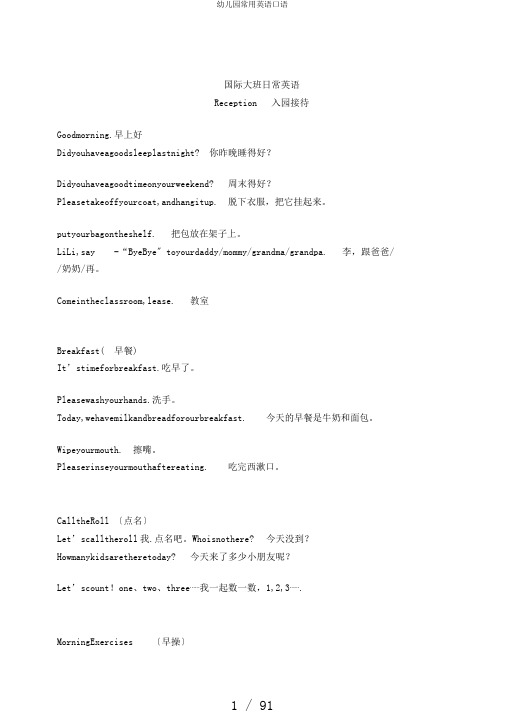
国际大班日常英语Reception 入园接待Goodmorning.早上好Didyouhaveagoodsleeplastnight? 你昨晚睡得好?Didyouhaveagoodtimeonyourweekend? 周末得好?Pleasetakeoffyourcoat,andhangitup. 脱下衣服,把它挂起来。
putyourbagontheshelf. 把包放在架子上。
LiLi,say -“ByeBye〞toyourdaddy/mommy/grandma/grandpa. 李,跟爸爸/ /奶奶/再。
Comeintheclassroom,lease. 教室Breakfast( 早餐)It’stimeforbreakfast.吃早了。
Pleasewashyourhands.洗手。
Today,wehavemilkandbreadforourbreakfast. 今天的早餐是牛奶和面包。
Wipeyourmouth. 擦嘴。
Pleaserinseyourmouthaftereating. 吃完西漱口。
CalltheRoll 〔点名〕Let’scall theroll我.点名吧。
Whoisnothere? 今天没到?Howmanykidsaretheretoday? 今天来了多少小朋友呢?Let’scount!one、two、three⋯⋯我一起数一数,1,2,3⋯⋯.MorningExercises 〔早操〕It’stimetodomornigexercises.在是早操.Let’sgooutandlineup.一起出去排。
Oneline/Twolines,please. 排成一/两。
Attention.立正!〔onetwo〕Marchinyourplace,onetwoone ⋯原地踏步。
一二一⋯⋯Handsontheshoulders.手搭〔前面小朋友〕肩膀。
Let’sgobacktotheclassroom!我回教室吧!Onebyone,please.一个接一个。
- 1、下载文档前请自行甄别文档内容的完整性,平台不提供额外的编辑、内容补充、找答案等附加服务。
- 2、"仅部分预览"的文档,不可在线预览部分如存在完整性等问题,可反馈申请退款(可完整预览的文档不适用该条件!)。
- 3、如文档侵犯您的权益,请联系客服反馈,我们会尽快为您处理(人工客服工作时间:9:00-18:30)。
Topic1、Probably.中文:可能吧。
Topic2、Absolutely impossible!中文:绝对不可能的!Topic3、That couldn't be better.中文:那再好不过了。
Topic4、Maybe some other time.中文:也许下一次吧。
Topic5、Have you got anything larger?中文:有大一点儿的吗?Topic6、I can't tell.中文:我说不准。
Topic7、Let's celebrate!中文:让我们好好庆祝一下吧!Topic8、Can I take a message?中文:要我传话吗?Topic9、I apologize.中文:我很抱歉。
Topic10、Can you give me a wake-up call?中文:你能打电话叫醒我吗?Topic11、Have you ever been to China?中文:你去过中国吗?Topic12、I'm lost.中文:我给搞糊涂了。
Topic13、Come in and make yourself at home. 中文:请进,别客户。
Topic14、I'm broke.中文:我身无分文。
Topic15、I assure you.中文:我向你保证。
Topic16、I thought so, too.中文:我也这样以为。
Topic17、It slipped my mind.中文:我不留神忘了。
Topic18、It's a nice day today.中文:今天天气很好。
Topic19、It's just what I had in mind.中文:这正是这想要的。
Topic20、Let's get together sometime. 中文:有时间我们聚一下吧。
Topic21、Thanks for the warning.中文:谢谢你的提醒。
Topic22、Long time no see.中文:好久不见。
Topic23、Can I have a word with you? 中文:我能跟你谈一谈吗?Topic24、Please make yourself at home. 中文:请别客气。
Topic25、Take care.中文:请多保重。
Topic26、Thanks a million.中文:非常感谢。
Topic27、Dinner is on me.中文:晚饭我请客。
Topic28、May I try it on?中文:我能试穿一下吗?Topic29、Can I take a rain check?中文:你能改天再请我吗?Topic30、I mean what I say.中文:我说话算数。
Topic31、Don't mention it.中文:不必客气。
Topic32、I'll check it.中文:我去查一下。
Topic33、So far, so good.中文:到目前为止还好。
Topic34、It's incredible.中文:令人难以置信、不可思议。
Topic35、It's been a long time.中文:好久不见了。
Topic36、I'm in good shape.中文:我的身体状况很好。
Topic37、May I ask you a question?中文:我可以问一个问题吗?Topic38、It's worth seeing.中文:它绝对值得一看。
Topic39、It's awful.中文:真糟糕。
Topic40、I'm on my way.中文:我这就上路。
Topic41、I'm sorry I'm late.中文:对不起,我迟到了。
Topic42、I'm glad you enjoyed it.中文:你喜欢我就高兴。
Topic43、I'll think it over.中文:我仔细考虑一下。
Topic44、Enjoy your meal.中文:请慢慢享用吧。
Topic45、I'll take your advice.中文:我接受你的忠告。
Topic46、That's disgusting.中文:真讨厌。
Topic47、Is that OK?中文:这样可以吗?Topic48、I can manage.中文:我自己可以应付。
Topic49、Can you make it?中文:你能来吗?Topic50、All I have to do is learn English. 中文:我所要做的就是学英语。
Topic51、It's only a matter of time.中文:这只是时间问题。
Topic52、I'll get it.中文:我去接电话。
Topic53、I'll be right with you.中文:我马上就来。
Topic54、Let's make up.中文:让我们言归于好吧。
Topic55、Have you finished yet?中文:你做完了吗?Topic56、Can I take your order?中文:您要点菜吗?Topic57、I suppose so.中文:我想是这样。
Topic58、Don't take any chances.中文:不要心存侥幸。
Topic59、Can I have a day off?中文:我能请一天假吗?Topic60、That rings a bell.中文:我总算想起来了。
Topic61、I'd like a refund.中文:我想要退款。
Topic62、Forget it.中文:算了吧。
Topic63、Catch me later.中文:过会儿再来找我。
Topic64、Don't jump to conclusions.中文:不要急于下结论。
Topic65、Do you speak English?中文:你会说英语吗?驾驶员试题网/科目三考试Topic66、Tomorrow never comes.中文:莫依赖明天。
Topic67、What's your favorite food?中文:你最喜欢的食物是什么?Topic68、You never know.中文:世事难料。
Topic69、What are your plans for the weekend? 中文:你周末计划做什么?Topic70、The sooner, the better.中文:愈快愈好。
Topic71、What's the deadline?中文:截止到什么时候?Topic72、Where can I go for help?中文:我该怎么办呢?Topic73、What do you do for relaxation?中文:你做什么消遣。
Topic74、That's life.中文:这就是生活。
Topic75、The same to you.中文:你也一样。
Topic76、You are just saying that.中文:你只是说说而已。
Topic77、What is it like there?中文:那儿怎么样?Topic78、Would you care for a drink?中文:你要不要来点儿喝的?Topic79、What's on your mind?中文:你在想什么呢?Topic80、We are in the same boat.中文:我们的处境相同。
Topic81、You've made a good choice.中文:你的眼力不错。
Topic82、There is a call for you.中文:有你的电话。
Topic83、That's worthwhile.中文:那是值得的。
Topic84、What is it about?中文:这是关于什么的。
Topic85、You will have to wait and see. 中文:你得等一等看。
Topic86、What a shame!中文:真是遗憾!Topic87、The shortest answer is doing. 中文:最简短的回答是干。
Topic88、You've got a point there.中文:你说的有道理。
Topic89、That's OK.中文:可以。
Topic90、You can count on me.中文:你可以指望我。
Topic91、Time is money.中文:时间就是金钱。
Topic92、What a coincidence!中文:真是太巧了!Topic93、There is no doubt about it.中文:那是毫无疑问的。
Topic94、What do you recommend?中文:你推荐什么?Topic95、That's the way I look at it, too. 中文:我也是这么想。
Topic96、What's the purpose of your visit? 中文:你来访的目的是什么?Topic97、You should take advantage of it. 中文:你应该好好利用这个机会。
Topic98、You did a good job.中文:你干得很好。
Topic99、That's not a problem.中文:那没问题。
Topic100、You need a vacation.中文:你需要休假。
